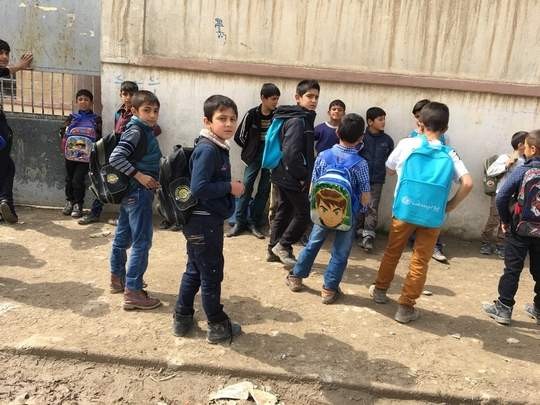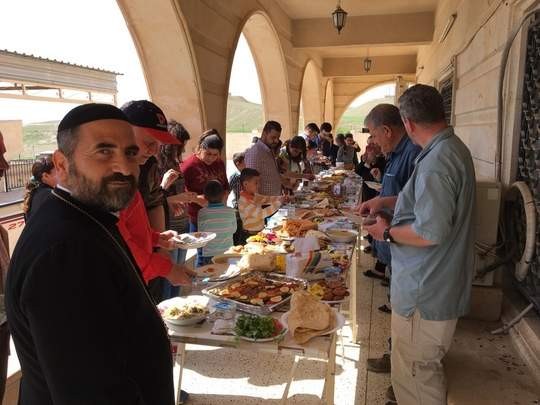
Children are back in school in Mosul. (Photo by Stan Jones for The News-Sentinel)
ishtartv.com - news-sentinel.com
A
column by Stan Jones, for The News-Sentinel Tuesday, July 04, 2017
They
were selfless in helping others as things try to normalize.
Editor's note:
Stan Jones of Spencerville has been working with
a non-governmental
organization operating in northern Iraq.
This is the last of his occasional
columns for The News-Sentinel.
In author Atina Grossman's 2007 book, “Jews,
Germans, and Allies,” she points out that for many of rural Germany's residents
the day-to-day confrontation of World War II was late in coming. The massive
British and American bombing raids targeted primarily urban industrial and
war-making sites, leaving the countryside relatively untouched. The generally
unscarred rural landscape continued until after D-Day when the Allies went into
France and pushed toward Berlin. With exceptions to certain consumer shortages
and the ever-increasing death-in-combat notifications, life went on as before.
Even when an entire nation is at war, not everyone is in the trenches on the
front lines.
Life
in Kurdistan, northern Iraq, has a somewhat similar tale. As noted previously,
the eastward thrust of the so-called Islamic State from Syria into Iraq
initially destabilized the status quo. However, after the IS invasion stalled
and defensive lines were established, domestic civilian life reactivated and
now approaches normality. Although the IS was always a direct threat, they
never came within artillery range of significant population centers in
Kurdistan. Now business is getting better, children attend school, weddings
occur and futures are again imagined and hoped for.
This
is not a claim that all is well. The thousands of internally displaced Iraqis
still require attention until they can return to their homes. The fighting has
caused a wide swath of physical destruction as well as the personal trauma
that's attached; homes razed, infrastructure destroyed, missing or killed
family members, everything in great need. Unfortunately, many on the ground now
believe attention will wane and support for re-building diminish as the
fighting subsides and headline grabbing problems appear elsewhere in the world.
Also, the very real and understandable problem of donor fatigue may set in
curtailing the many resources needed.
There
is much to remember about this time in Iraq, the good and not so good, but
mostly it's the people met along the way. There was Father Zacharias, the
Syriac Orthodox pastor, and his parishioners who invited us to stay for their
weekly “potluck” luncheon, even though we arrived at their church unplanned and
unannounced. Their generosity to strangers was in the best Christian tradition.
Their village sat at the foot of the Mar Mattai Monastery and was at one time
less than eight miles from the front lines.
There
was the young Yazidi woman who worked for us in the infant and well-baby
program, an effort designed to help young mothers in the internally displaced
person camps cope with and thrive in that environment. She was saving her
salary and wanted to eventually leave Iraq and study abroad. There was the
“surfer dude” from California who was working to expand and enhance the
delivery of goods and food stuffs to non-camp IDPs. He was in Iraq looking for
an adventure but had a desire to do something better than install solar panels
on the left coast. Even though the young American had difficulty negotiating
the office stairwell, she had a heart of gold and her work with the camp
children showed it. There were expatriates from the Philippines, New Zealand,
Canada, the UK and France all living and working to serve those in great need
and not to be served themselves.
And
then there was the local-national safety and security staff who provided a continuously
updated status on general and specific security concerns, allowing the several
active programs to conduct their business with relative certainty. If a problem
or question walked into the office or arrived by phone or was encountered in
the field they worked well as a team to find a solution. The office walls were
covered with the latest maps and contact names to allow them to verify or not,
rumors and claims of pertinent IS activity that could affect our folk. Whether
trolling the internet for open- source information or gathering reports from
their many local government and military contacts, they helped establish and
maintain a safe work environment. And finally, a shout-out to the many Iraqi
residents who comprised the backbone of the distribution system providing the
World Food Programme supplies to the IDP camps.
Thomas
Wolfe was not entirely correct: home is home wherever it is and it's good to
return. Besides, some delayed projects around the homestead need tending. And
the golf courses are open. Now if only the Fort Wayne TinCaps and Detroit
Tigers were playing better, it might be a decent season yet.

A Syriac Orthodox parish welcomed Stan Jones and other humanitarian workers to their potluck. (Photo by Stan Jones for The News-Sentinel)
|